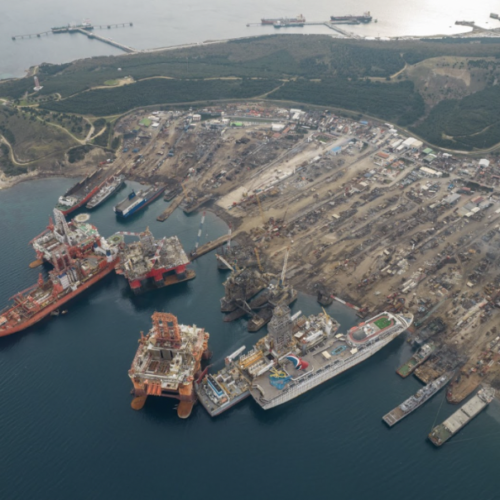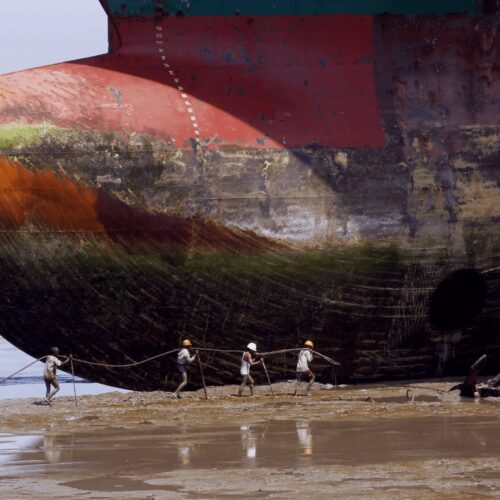Press Release – NGOs win FPSO North Sea Producer case
Bangladesh Court denounces illegalities and lack of transparency in shipbreaking sector
On 14 November the High Court Division of the Supreme Court of Bangladesh declared the import, beaching and breaking of the infamous FPSO North Sea Producer illegal. The judgment was issued in a Public Interest Litigation (PIL) filed by NGO Shipbreaking Platform member organisation Bangladesh Environmental Lawyers Association (BELA). The Court further noted with dismay the incessant violations of national and international laws by the shipbreaking industry, and passed several directions upon the government to regulate the sector in line with earlier rulings.
Already in August 2017, the Bangladesh Court had issued an injunction on the ongoing breaking of the North Sea Producer based on the detection of radiation levels higher than permitted. It has now directed national agencies to monitor the breaking of what is left of the FPSO without any involvement of Janata Steel, the yard that had beached the vessel in 2016. The Department of Environment has also been directed to claim compensation from the yard for having violated national environmental rules.

Noting the plethora of illegalities and the lack of transparency in the sector, the Court directed authorities to i) subject cash buyers and agents to stricter scrutiny, including a detailed recording of their particulars, and to hold them accountable to the strictest sanctions; ii) regulate the import of vessels registered under “last voyage” grey- or black-listed flags which are particularly popular with cash buyers, including Comoros, Palau and St. Kits and Nevis, and; iii) ensure that no vessel is imported without proper verifiable pre-cleaning certificates and declarations of in-built hazardous wastes, and/or by yards that do not fully comply with the requirements for obtaining an Environmental Clearance.
Whilst the recent ruling on the illegal import of the North Sea Producer stresses the systemic illegalities of the entire ship breaking sector, and also highlights the deficiencies of local agencies responsible for the enforcement of environmental and labour laws, the illegal export of the vessel from the UK is still being investigated by UK environmental agency DEFRA. After winning the case on the illegal import and beaching of the North Sea Producer, owned by Danish A.P. Moeller Maersk and Brazilian Odebrecht, NGOs now urge the UK to hold the ship owners and cash buyer GMS accountable for the illegal export of the toxic FPSO. As previously reported, the North Sea Producer was allowed to leave the UK in 2016 based on claims that it would be further operationally used.


Related news

Press Release – NGOs respond to legal threats by shipbreaking industry and withdraw from industry conference
On Monday, the NGO Shipbreaking Platform, an international coalition of labour, human rights and environmental organisations, withdrew their participation from the TradeWinds Ship Recycling Forum that starts… Read More

Press Release – Dutch prosecutors press criminal charges against Seatrade
CORRECTION Brussels, 15 February 2018 – Following discussions with the Dutch Public Prosecutor, cash buyer GMS was not confirmed to be the end-buyer of the… Read More

Press Release – Human rights and environmental NGOs urge UNDP to ensure the clean and safe recycling of FSO Safer
The NGOs warn against the possibility of the FSO being scrapped at one of the notorious South Asian shipbreaking yards.
... Read More
Press Release – European ship owners on promotional tour in Alang – environmental and human rights activists denied access
Tomorrow, European ship owners, government representatives of France, Germany and Belgium, and the European Commission will visit the Alang shipbreaking yards. Despite several indications that NGOs, including… Read More

Press Release: Need for reform of ship recycling sector in Turkey has never been more apparent after massive fire and waste dumping scandal revealed
In recent months, Turkey’s ship recycling sector has experienced significant movements. From controversies surrounding the sale of shipbreaking yards to the arrival of a UK Navy vessel,… Read More

Platform publishes South Asia Quarterly Update #31
Five workers suffered an accident on South Asian beaches in the third quarter of 2022.
... Read More

